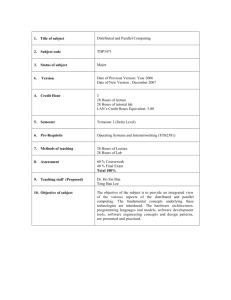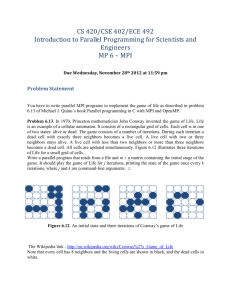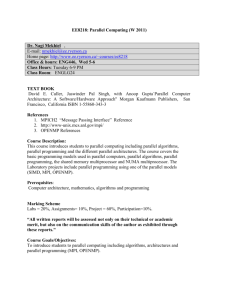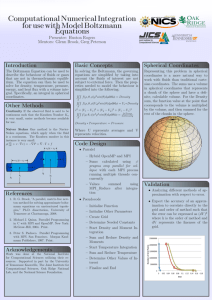Introduction to Parallel Processing
advertisement
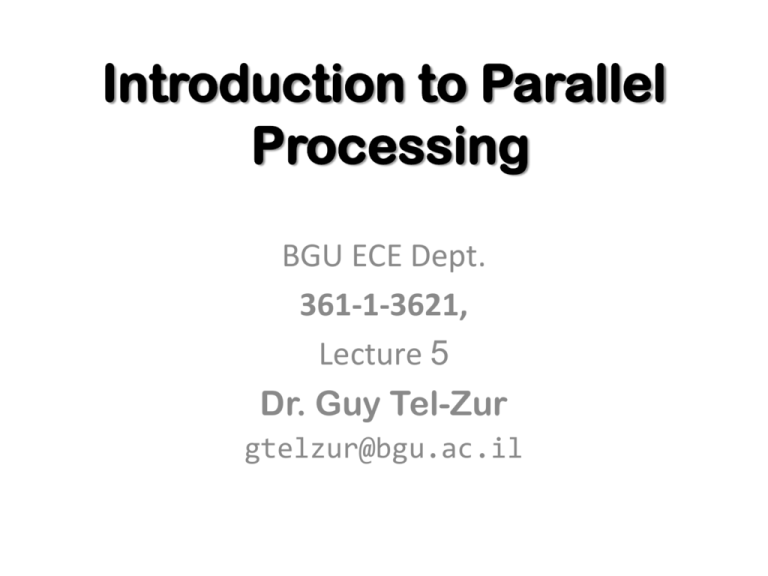
Introduction to Parallel
Processing
BGU ECE Dept.
361-1-3621,
Lecture 5
Dr. Guy Tel-Zur
gtelzur@bgu.ac.il
Agenda
•
•
•
•
•
•
•
•
מנהלה
לעשות חזרה על חלק מהמושגים:מטרת החלק הראשון של השיעור
שנלמדו בשיעורים הקודמים ולעבות ולסכם את הידע בנושאים אלה
Sending a 2D array in MPI
Network Performance – Revisited
Collective commands
Send/Recv types and summary
:בחלק השני של השיעור נלמד נושאים חדשים
Performance Evaluation of Parallel Programs
PBS demo
Parallel Computing environments for this course
Synchronous Parallel Computations
.7 להגשה בשיעור מספר2 מתן תרגיל בית מספר
•
•
•
•
מנהלה
• הרצאות הגמר – לחפש נושא (ראו אתר הקורס)
• עד שיעור מס' ,8על כל תלמיד לקבל אישור
מהמרצה אודות נושא הרצאת הגמר שלו
Recommended online
references
• Designing and Building Parallel Programs,
by Ian Foster
http://www.mcs.anl.gov/~itf/dbpp/
• http://www.mhpcc.edu/training/workshop/pa
rallel_intro/MAIN.html
• https://computing.llnl.gov/tutorials/parallel_c
omp/ by Blaise Barney, Livermore Computing
Another Linux Reference
• People who still don’t feel comfortable with
linux please consult this reference:
http://sc.tamu.edu/shortcourses/SCunix/introToUnix.pdf
About the status in MPI_Recv
• It is possible to Receive messages in nonselective ways:
– source = MPI_ANY_SOURCE
– tag = MPI_ANY_TAG
• This is useful for example in a Master-Worker
style where the master holds a workpool and
it gives a work unit upon each “recv”.
M-W Demo
• Embarrassingly Parallel Computation
– calculation by Monte Carlo (Previous lecture)
– Demo under:
/users/agnon/misc/tel-zur/mpi/pi_monte_carlo
- Execution:
mpirun -np 4 ./pi_reduce
• The source code – open IDE
Master-Worker (M-W) Demo
• Embarrassingly Parallel Computing paradigm
• Calculation of
Pseudo Code - Serial Version
npoints = 10000
circle_count = 0
do j = 1,npoints
generate 2 random numbers between 0 and 1
xcoordinate = random1
ycoordinate = random2
if (xcoordinate, ycoordinate) inside circle
then
circle_count = circle_count + 1
end do
PI = 4.0*circle_count/npoints
Pseudo Code - Parallel Version
npoints = 10000
circle_count = 0
Must use
p = number of tasks
different seeds
num = npoints/p
find out if I am MASTER or WORKER
do j = 1,num
generate 2 random numbers between 0 and 1
xcoordinate = random1
ycoordinate = random2
if (xcoordinate, ycoordinate) inside circle then
circle_count = circle_count + 1
end do
if I am MASTER
receive from WORKERS their circle_counts compute PI
(use MASTER and WORKER calculations)
else if I am WORKER
send to MASTER circle_count
endif
M – W Monte-Carlo calculation of
• Reference to the source code:
http://www.pdc.kth.se/training/Tutor/MPI/Templat
es/pi/index.html#top
• pi_send.c
• pi_reduce.c
• dboard.c
• make.pi.c
• However, I had to modify the scaling of random
numbers – see next slide
0<r<1
• Instead of:
cconst = 2 << (31 - 1);
r = (double)random()/cconst;
• I had to change the code to:
r = ((double)rand() /
((double)(RAND_MAX)+(double)(1)));
Mandelbrot set
MPI on Windows…
Usage: client – servers mode
cd to c:\program files (x86)\deinompi\examples
on shell window #1: ..\bin\mpiexec –n 4 pmandel
on shell window #2: pmandel_vis, then open TCP port 7470
Sending a 2D array in MPI between
two tasks
• A simple demo – turn to the demo
• The source code is enclosed – next slide
• Implementation on Windows Vista using
DeinoMPI and DevC++
// Guy Tel-Zur (c) 2009
// This is a demo for PP2010A course
// sending a 2D array - study pointers
#include <mpi.h>
int main (int argc, char **argv) {
int dim = 3; // array dimension
int smat[dim][dim]; //send matrix[row][col]
int rmat[dim][dim]; // recv matrix
int i,j;
int mytid, nproc;
int MASTER = 0;
int WORKER = 1;
int tag = 99;
MPI_Status status;
MPI_Init(&argc, &argv);
MPI_Comm_rank(MPI_COMM_WORLD, &mytid);
MPI_Comm_size(MPI_COMM_WORLD, &nproc);
printf ("MPI task ID = %d\n", mytid);
if (nproc != 2) {
printf("This program needs exactly 2 processes\n");
exit (1);
}
if (mytid == 0) {
// fill the matrix
smat[0][0] = 1; smat[1][0] = 4; smat[2][0] = 7;
smat[0][1] = 2; smat[1][1] = 5; smat[2][1] = 8;
smat[0][2] = 3; smat[1][2] = 6; smat[2][2] = 9;
printf("Thie is master\n");
for (i=0;i<dim;i++) {
for (j=0;j<dim;j++)
printf("%i",smat[i][j]);
printf("\n");
}
// send the 2D matrix as a linear array to the Worker
MPI_Send(&smat,dim*dim,MPI_INT,WORKER,tag,MPI_CO
MM_WORLD);
} else {
MPI_Recv(rmat,dim*dim,MPI_INT,MASTER,tag,MPI_COM
M_WORLD,&status);
printf("The is worker\n");
for (i=0;i<dim;i++) {
for (j=0;j<dim;j++)
printf("%i",rmat[i][j]);
printf("\n");
}
}
// That's it!
MPI_Finalize();
}
Use DeinoMPI
for the demo!!!
Network Performance
The time needed to transmit data
Source: Stanford
MPI_Isend
“Latency Hiding”
Identifies an area in memory to serve as a send buffer. Processing
continues immediately without waiting for the message to be copied
out from the application buffer. A communication request handle is
returned for handling the pending message status. The program
should not modify the application buffer until subsequent calls to
MPI_Wait or MPI_Test indicate that the non-blocking send has
completed.
Some Common Collective
Commands
Source: https://computing.llnl.gov/tutorials/parallel_comp/
Allgather
MPI_Reduce
MPI_Reduce
MPI_Reduce
Users can also define their own reduction functions by using the MPI_Op_create routine
MPI_Allreduce
MPI_Reduce_scatter
Domain Decomposition:
Different ways to partition data
Source: https://computing.llnl.gov/tutorials/parallel_comp/
Overhead and Complexity
Source: https://computing.llnl.gov/tutorials/parallel_comp/
PBS/Torque – job scheduling
• -N myjob15 specifies the name of the job will
be myjob15
• -l nodes=1:ppn=1 specified that the job will
use 1 node and that there is 1 processor per
node.
PSB/Torque
PSB/Torque
References
• Torque:
http://www.clusterresources.com/products/tor
que-resource-manager.php
• OpenPBS:
http://openpbs.org
Parallel Computing
environments for this course
• Our Linux Cluster: vdwarf
• Your own resources:
– A dedicated Linux installation with MPI
– Install MPI on Windows
– Dual boot Linux/Windows
– Windows + Cygwin
– Virtualization:
• VMware Player, VirtualBox…
– Parallel Computing on the Cloud ($)
Turn to Algorithms Slides
• Synchronous Parallel Computations
Next Lecture
• Condor
– http://www.cs.wisc.edu/condor



